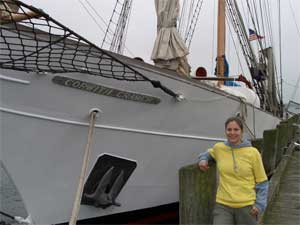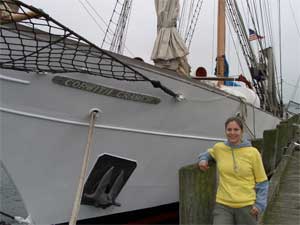 Career in aquatic medicine on the horizon
Career in aquatic medicine on the horizon
KINGSTON, R.I. – May 4, 2009 – When Lauren Korecky enrolled at the University of Rhode Island, she knew she wanted to ride horses and study marine biology. But as she looks toward graduation on May 17 as the University’s top aquaculture student, she had no idea that a career in aquatic medicine was in her future.
When the Manalapan, N.J. resident took an elective course in aquaculture as a sophomore, she was immediately intrigued by the discipline.
“I fell in love with the topic material and the professors, and there was no going back,” Korecky said. “I just loved the professors and their passion about aquaculture, so they made it easy and interesting to learn. And they had traveled everywhere, so it was exciting hearing where they had been.”
She was awarded a Coastal Fellowship to work on a research project with her favorite professor, Marta Gomez-Chiarri, to learn about lab work and get a taste for what her career might be.
“We did a challenge with oysters, experimentally infecting them with a parasite and comparing them to uninfected oysters,” Korecky said. “We were looking for the activity of a specific protein to see if it positively affects their immune response. Does this protein help them fight off the parasite, and if it does, can you breed oysters with more of that protein so they don’t get sick in farms?”
As a junior she took a graduate level course on the diseases of aquatic organisms, which launched her on a career path that will include enrolling in veterinary school.
“Vet school for aquatic organisms is a new sort of thing, but it’s on the rise because of the growth of the aquaculture industry,” said Korecky. “They need medical personnel who can travel from farm to farm to monitor the animals and analyze what might be wrong. Unlike a vet at an aquarium, which only has a few individuals of any one species, aquaculture facilities can have 300,000 fish, so if you don’t identify the problem quickly you could lose them all.”
While pursuing her undergraduate studies, the URI student took advantage of numerous opportunities to expand her horizons. She participated in SEA Semester, which she described as “easily one of the best experiences of my life,” during which she spent six weeks on land studying oceanography and how to operate a sailing vessel, and six weeks sailing from Massachusetts to Trinidad and back.
“While onboard, we were totally in charge of sailing the boat, and we had to do an oceanography research project while we were out there,” she explained. “I did a project on zooplankton in the surface waters, surveying any and all the plankton we could find and trying to figure out if there is more at night or during the day, in warm waters versus cold, and in areas where there was a current or no current. It was a very broad project, and a lot of our hypotheses actually happened.”
Korecky also spent a month in Costa Rica studying the diversity of mammals that live on coffee plantations. She trapped forest mice, opossums, tropical bats and other animals to compare the numbers and variety of species found in shade-grown coffee plantations with those found in traditional coffee plantations.
Throughout her college education, Korecky also competed on the URI equestrian team, where she entered 10 horse shows each year to accumulate points.
“It was a nice team bonding experience,” she said. “Horseback riding here is very different from my experience outside of school. It’s a very different type of riding that took some getting used to, but by the end of my freshman year I got into it, and by my senior year I reached the highest division and went to the first round of finals.”
Following graduation, Korecky will spend the summer as an intern at New England Aquarium in Boston to get her first real-world experience with aquatic medicine. Then she plans to enroll at Rutgers University to earn a master’s degree in pathology as preparation for veterinary school.
“Eventually I expect to be working with universities and aquaculture farms somewhere along the coast or near a large lake system or river,” she said. “I could even end up in Asia, where aquaculture is really big. It doesn’t matter to me whether I’m working with finfish or shellfish; I want to do it all.”


